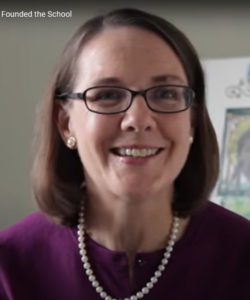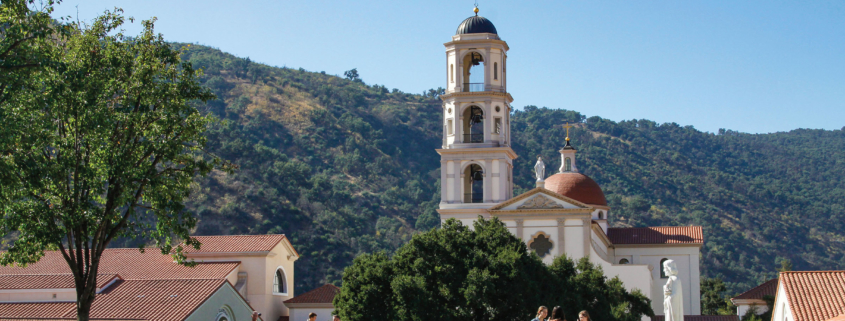Homeschool Leader Formed at Faithful Catholic College

Laura Berquist (Courtesy of Mother of Divine Grace on YouTube.)
Laura Berquist (née Steichen), foundress of the Mother of Divine Grace (MODG) homeschool program, prepared for her important calling at faithful Thomas Aquinas College in California.
But in 1969, she didn’t know what was in store for her when she and her parents went to check out the new liberal arts college opening that fall. Her parents had read an article written by conservative author Russell Kirk in the National Review, and they decided to look into it.
“We went to the campus in Malibu Canyon,” Berquist explains, “and met two of the founders: Dr. [George] Neumayr and Dr. [Ronald] MacArthur. We talked about the plans for the college and the difficulties of starting a school from scratch.”
Then Dr. MacArthur started asking his own questions, she recalls.
“He said, ‘Well, Laura, what’s the best part of you?’ ‘Oh, no,’ I thought, ‘it’s a test.’ ‘Um, my mind?’ ‘Good, good,’ he said, and I gave an internal sigh of relief. ‘Passed that one,’ I thought.
“Then another question: ‘And what’s the best thing you can do with your mind?’ ‘Oh, dear,’ I thought, but I said, ‘Think about God?’ ‘Very good,’ he said. And then he gave me a hearty slap on the back. ‘So, are you going to come here and do the best thing you can do with the best part of yourself?’ ‘I guess I am,’ I said.”
Education for humanity
Berquist graduated in 1975 and has only good things to say about Thomas Aquinas College, a Great Books program that is one of the faithful institutions recommended in The Newman Guide for its strong Catholic identity.
“In a liberal education, you acquire the intellectual formation necessary to learn about the highest things,” Berquist says. “Once I got to TAC, I learned the longer version of what liberal education is. I also learned that it is the education that recognizes that man is made in the image and likeness of God, and that that likeness lies in man’s intellect and will.
“Knowledge is a good in itself, because it makes one more perfectly what he is: a creature with the power to know, and more like God, who is the First Truth. That has informed everything I have since done and thought.
“I also learned that there is an order in education that is essential, and that formation and information are not the same thing. They are clearly related, but formation allows one to think rightly about new concepts, while information concerns the content of those new concepts. You need both.
“Since the good is diffusive, once the importance of this kind of education is seen, one wants to share it whenever possible,” Berquist says. “All of that informed the curriculum I worked out for my children, and then eventually wrote for MODG.”
Her perspective includes that of a mother, since all six of her children have graduated from Thomas Aquinas College.
“People are often worried about whether a liberal arts education is pertinent for teaching vocational skills,” Berquist notes. “This is what I say, because this is the formation I received: the education at TAC is the education for man as man. It fits his nature. It makes him more perfectly what God intends him to be. It forms his mind and heart so that he is able to know and love the highest things in the way that is possible in this life.
“Since it does that, it prepares him not just for a job, though I think it does that, but it prepares him to live his life here in such a way that he is ready for his ultimate goal: life with God. As a parent, I want my children to be happy in this life and, especially, in the life to come. I want an education that is ordered to both of those goals. If one is prepared for this life, but not the life to come, then he is missing what is most important.
“Saint Cardinal Newman said, ‘If our hearts are by nature set on the world for its own sake, and the world is one day to pass away, what are they to be set on, what to delight in, then?’ I want my children to order their lives to Eternal Life, and I think Catholic liberal education as found at Thomas Aquinas College offers the formation that makes that possible. I have tried to share that vision with all the families in MODG.”
Education to know God
Berquist’s vision for Catholic education has been formed and shaped by her time at TAC, which is ultimately what allowed her to form MODG. “Catholic education—whether it’s homeschooling, private, or parochial—is ordered to educating the human as human, and he’s ordered to the truth, and specifically, to the Truth Himself, God.” Such an education must be ordered to forming the whole person, and Berquist finds this especially in classical liberal arts education.
“Classical education is Catholic education, because it’s ordered by its nature to the Supreme Being,” she says. And as St. Thomas Aquinas argues that the supreme goal of all the arts and sciences is the study of theology, “We must put children’s minds on sacred theology, so that they use them to know the best and noblest Being.”
“Reality is knowing God. God is the first cause, and everything comes from Him and goes back to Him. If you don’t have that context, you’re not seeing things in the right way.”
She continues: “Many see liberal education as a waste of time, because you spend four years without training for a job.” The reality, however, is that “we’re not going to be a worker forever; we’re going to be human persons forever.” Catholic education should truly take these things into consideration, because of all education systems, it is the one that truthfully focuses on God.
Berquist experienced this beautiful education at Thomas Aquinas College, and it influenced her method in creating MODG. MODG, now in its 25th year, serves 6400 students, and the curriculum Berquist wrote is used by many more. There is no measuring the impact and value of a faithful Catholic education, which is meant to be shared, as Berquist has done for so many families around the world. From these seeds, comes the renewal of Catholic education and the Church in America.

